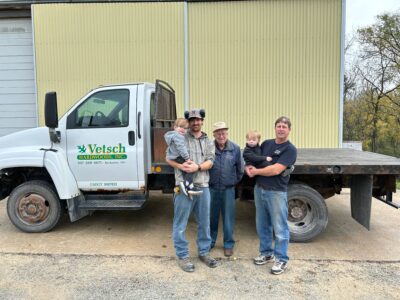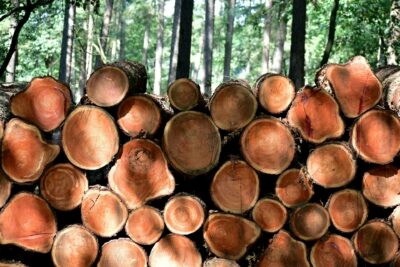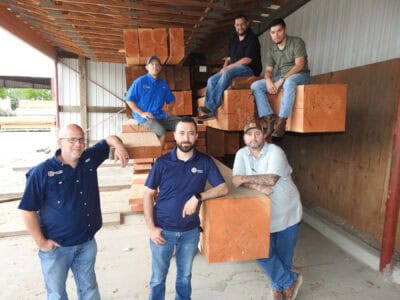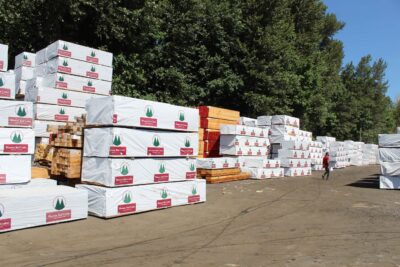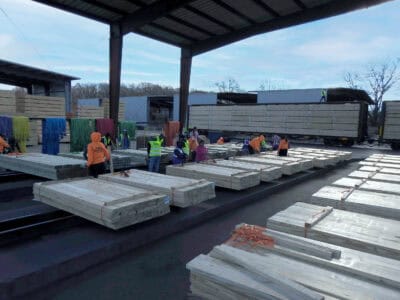AHEC is currently in the process of implementing the next phase of the European Union Deforestation Regulation (EUDR) response mechanism for U.S. Hardwoods. The framework that is being developed comprises the following components:
- a regularly updated database differentiating U.S. Hardwood harvest geolocations which are “deforestation-free” from those which are not “deforestation-free.”
- an on-line application to make this data freely accessible to U.S. Hardwood mills and other operators engaged in the export trade.
- independent third-party assessments of the risk of illegal harvesting in the U.S. Hardwood producing states.
- a chain of custody (CoC) standard for Hardwood mills and downstream distributers, exporters, and manufacturers to ensure that the legal and deforestation-free claim is applied only to verified U.S. Hardwood.
The database of U.S. Hardwood harvest geolocations will be prepared and maintained by a technical consultancy commissioned by AHEC that will combine satellite imagery with digital cadastral (property) data. By regularly monitoring these datasets (at least quarterly), and through development of algorithms, use of AI, and ground truthing as required, the technical consultancy will categorize all Hardwood forest disturbances into those where there is evidence of deforestation and those where there is evidence of selection harvesting/continuous cover operations not leading to deforestation which are thereby “deforestation-free.” The database will allow for regularly updated quantification of deforestation risk in the U.S. Hardwood sector at national, state and more localized levels.
After an extensive bid out process AHEC have selected a specialist data company that already has experience of building data operating systems to monitor land changes. They have been commissioned to pilot a simulation of this system for a single Hardwood-producing state. This pilot will help clarify how satellite data can identify canopy changes that signify Hardwood harvests and those which are deforestation-free and the level of resolution and frequency of forest assessment required to satisfy the law. It will also provide an opportunity to present a working model to the European Commission’s (EC) EUDR working group and to EU regulators before it is rolled out across all Hardwood producing States. AHEC will make the initial presentation to the EU Commission as well as the enforcement agencies in Germany, Italy and Spain in mid April.
U.S. state legality risk assessments aligned with EUDR requirements are now being prepared for the 33 states identified as significant producers of Hardwoods. The assessments were commissioned by AHEC from Dovetail Partners in November 2023 and are due for completion by June this year. They are being undertaken according to the “Framework for Jurisdictional Risk Assessment of Legal Compliance of Hardwood Production in the USA” developed by AHEC’s Sustainable Hardwood Coalition (SHC) initiative. This functions as a standard for consistent evaluation of the risk of sourcing illegally harvested Hardwood within each state jurisdiction and covers all aspects of legal harvesting and trade required of EUDR. For the assessment, Dovetail Partners has put together a team of experienced forestry and natural resource professionals with extensive experience in applied forest management, sustainability assurance and risk assessment. The risk assessment process involves review of publicly available information as well as interviews with knowledgeable experts and stakeholders, including staff at state agencies, university extension, industry/landowner associations, NGOs, and other groups. Each completed assessment is subject to additional scrutiny by an independent expert before publication as an SHC-endorsed risk assessment.
Impact of EUDR for European wood supply becoming evident. There is further evidence of the concerns the European wood sector has in terms of the potential impact of the EUDR on their trade in the form of a letter written from the German wood sector to the EC. It raises the question that the emerging impact of European wood production and supply could unfairly harm legitimate supplies that are recognized deforestation-free and already comply with the EUTR. The impacts could be particularly onerous on forests where there are large numbers of private landowners such as in Germany and France while being easier for countries with large state-owned forest land such as Poland and Croatia. We already know from observing the roll- out of the EUTR, a much simpler process, that implementation and enforcement varied significantly across member states. So, it is feared that EUDR could further amplify these different approaches and clearly this a concern to German wood industries, who anticipate an immediate and robust response from their appointed regulators.
Responding to current geolocation requests, AHEC is aware that U.S. Hardwood exporters are already receiving requests for geolocation data not just from EU Hardwood importers but also importers outside the EU selling product into the single market. These requests are partly driven by ignorance of the timing and requirements of the law and partly by genuine concern that it is material being processed this year that they will be placing on the market next year after the law comes into force. At this point in time without a data system in place to provide and analyse geolocations to show they are deforestation free, most exporters will be unable to comply. This does not mean that when the law comes into place the industry will be at a disadvantage. Why? Because the data system that AHEC is commissioning will be able to provide geolocation data for deforestation and degradation free plots of land from which the material in any given container could have come from (now understood to be an approach the EC will accept). The analysis of satellite data being commissioned by AHEC will identify all harvest geolocations across the U.S. Hardwood producing region, and their period of harvest since 31st December 2020, the cut-off date for EUDR. We’re confident that it will confirm that there is a negligible risk of deforestation or degradation in line with the EUDR definitions, and that all harvest geolocations supplied through the platform will be deforestation-free. The procedures for compiling the most relevant geolocation data for individual consignments delivered from 31st December 2024 when enforcement of EUDR is scheduled to begin, have yet to be worked out. However, this will be a priority when developing the chain of custody standard and procedures, a process that will start in February this year.
It is important to communicate that AHEC is working with the U.S. Hardwood industry to develop a system that will facilitate EUDR compliance. We advise that exporters reassure concerned buyers that a system is being developed that will potentially enable all containers of U.S. Hardwood arriving in the EU from 31st December 2024 to be accompanied by the documentation required to demonstrate legal and deforestation-free origin, including geolocation data. While we are extremely optimistic a workable solution can be developed in the time frame there are still many hurdles to overcome and much to learn as the system evolves. Establishing a funding stream and obtaining support in principle from the European Commission will be essential elements to ensure we can succeed. We will continue to provide regular updates and advise immediately if the situation changes.


